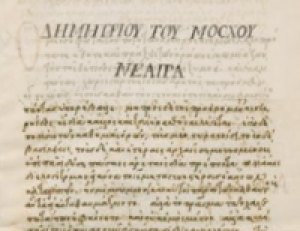
Abstract
This play was composed in classical Greek by Dimitrios Moschos, who was born in Sparta but moved to Italy; the comedy was published in 1475. Neaira references multiple themes and motifs found in classical Roman comedy, specifically in the works of Plautus and Terence, with which Moschos doubtless became familiar while he lived in Mantua. However, Moschos takes these elements and creates a completely original drama by incorporating features from other classical and Byzantine genres, such as Lucian's Dialogues of the Courtesans. This innovative approach sets the stage for the kind of novel treatment that Machiavelli would later demonstrate in his Mandragola, two generations later. In my talk, I analyze the plot and characters of Neaira, and I examine the diverse genres that influenced this distinctive play. I shall also situate Moschos' work within the intellectual milieu of Renaissance Italy.
Bio
Stavroula Kiritsi holds a bachelor’s degree in Philology from the University of Athens, and an MA and PhD in Classics from the University of London. She is an honorary Researcher in the Department of Classics, Royal Holloway University of London. Her research interests lie in classical Greek drama, especially comedy, and its modern reception, and also in Aristotle’s philosophy, especially his theory of character and emotions. She has published the book, Menander’s Characters in Context: From the 4th Century BC to the Modern Greek stage (Newcastle upon Tyne: Cambridge Scholars Publishing, 2019) and various articles on Greek comedy and its reception. Two of her current projects are a translation and commentary on Dimitrios Moschos’ comedy Neaira, and a comparative study of the emotional responses of audiences to Greek drama in Classical Antiquity and today. In this latter project, she further examines how emotions were conceived in classical antiquity and then in modern times, with special reference to the theatre.
Date: Feb. 21, 2024
Time: 9 a.m. Pacific TimeZoom Access Details: Join Zoom Meeting
Meeting ID: 847 6551 0156 | Passcode: 059619
